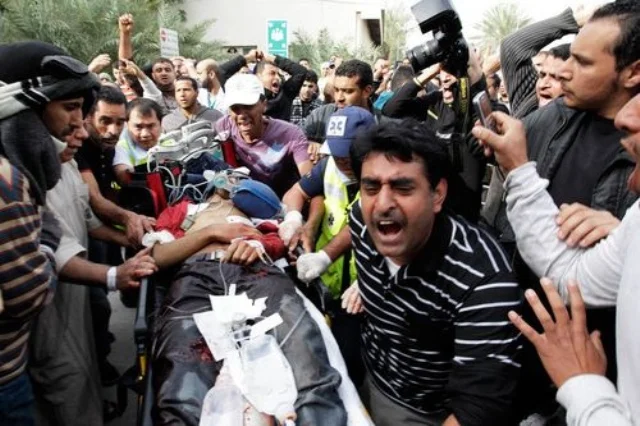Oil for Silence Fuels Bahraini Torture Deaths
/Ayanna Nahmias, Editor-in-ChiefLast Modified: 23:49 PM EDT, 23 May 2012
MANAMA, Bahrain — The call for democracy that began during Bahrain's Arab Spring has fomented into a full-scale revolution in response to the ruling Sunni monarchy's persistence in maintaining power by refusing to acquiesce to Bahraini citizens' demands for democratic elections.
External human rights groups have charged the monarchy with gross violations but lack sufficient access to the country to allow them to fully investigate. Internal investigations have confirmed that the Bahraini monarchy is guilty of gross human rights violations and have published their findings on several websites and papers found at the end of this post.
The latest victim of this dictatorial regime could be Yousef Mowali, 23, who was found dead of an apparent drowning earlier this week. However, Al Jazeera reported that autopsy results indicated evidence of torture, and if the allegations are proven true, then Mowali could be latest Bahraini to have died from torture while in the custody of Bahraini military police.
In testimony before the Bahrain Independent Commission of Inquiry (BICI), representatives of the monarchy continued to assert that all individuals in detention are being treated humanely as their cases progress through the justice system. They have also vociferously denied any culpability in the deaths of Mowali and others.
The ruling Sunni monarchy has politicized the human rights abuses occurring in their nation by claiming that the violence is the result of sectarianism instigated by the Shiite minority and covert Iranian operatives who seek to overthrow the monarchy.
According to the monarchy, the suppression of 'sporadic' violence in which some people may have sustained injuries is justified to maintain law and order and to protect the sovereignty of Bahrain.
Many countries in which martial law has been instituted under the guise of suppressing 'subversive elements,' find that once law and order is restored the military often refuses to relinquish power even after the crisis has passed.
In Bahrain the military could prove just as dangerous to the monarchy as they are to the protesters. This possibility is bolstered by images of wanton violence, destruction, and undisciplined behavior by a police force seemingly out of control.
The military in Bahrain has been responsible for the disappearance of hundreds of people, they have maimed, killed, and disappeared thousands more, and a growing number of women have been assaulted and raped by policemen.
Though human rights abuses have been substantiated through empirical evidence, it is the videotaped footage of police brutality that refutes the monarchy's claims of benevolence and a desire for sincere reform.
In late 1990 "some of the most egregious offenders includedIan Henderson, a former colonial officer employed in Bahrain who was accused by multiple witnesses of torturing prisoners. Adel Flaifel, a notorious security officer identified by many detainees as having overseen torture, both of whom were given immunity under Royal Decree 56 of 2002.
The torture described by many human rights reports was widespread and systematic. Up to 1866 who made up 64% of detainees reported being tortured during this time period by members from three government agencies, namely the Ministry of Interior, the National Security Agency, and theBahrain Defence Force. (Source: Wikipedia)
Victims claimed that representatives from each of these agencies were actively involved in interrogating detainees in relation to the unrest leading up to Bahrain's Arab Spring uprising.
Though, as one commentator noted, these figures hail from a 'distant' past, the fact that allegations of torture and abuse persist nearly twenty years later signifies a pattern of systemic and despotic governance. These abuses which have occurred over a long period of time have only become more visible because of the uprising, and the legislative reforms ratified by the BICI look good on paper but do not seem to have translated into real change.
At the grassroots level people are still suffering abuse at the hands of those who are charged with protecting them, and like the civil rights movements which occurred in other countries like South Africa, United States, and India to name a few, it was because of the sustained will of the people that these governments eventually had to bring their governance inline with the human rights legislation codified in their constitutions.
Most troubling about Bahrain's 'Bloody Spring' is the fact that both the United States and the United Kingdom, two countries that present themselves as the enforcers of global justice and the arbiters of human rights abuses, have remained silent on this grave issue. In fact, both governments have recently announced their support of the Bahraini monarchy during official state visits apparently out of fear that a rift between the two nations could adversely impact national security interests and oil supplies.
For more in-depth coverage of this issue view the news reports below, and since a picture is worth a thousand words, the video footage of the brutal crackdown and its victims presents undeniable proof that the Bahraini monarchy is unwilling to entertain democracy and will not go 'gently into that good night.'
Human Price of Freedom and Justice (Report)
Bahrain Human Rights Society. 22 November 2011.
Follow Nahmias Cipher Report on Twitter
Twitter:
Editor:
Related articles
Iran slammed over meddling (ireport.cnn.com)
UN: Bahrain to mull ways to improve rights record (dailystar.com.lb)
US & UK keep silence over Bahraini regime crimes (seeker401.wordpress.com)
Retrial Begins for Prominent Bahrain Activist (theepochtimes.com)
Bahrain Defends Human Rights Record at UN (abcnews.go.com)
Bahrain defends human rights record at UN (miamiherald.com)














